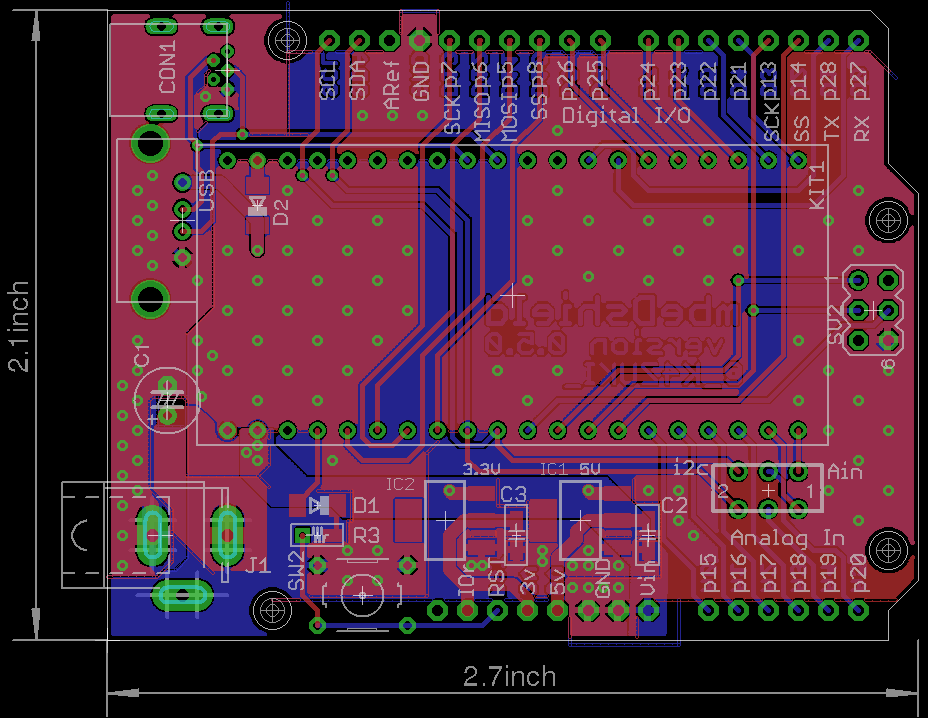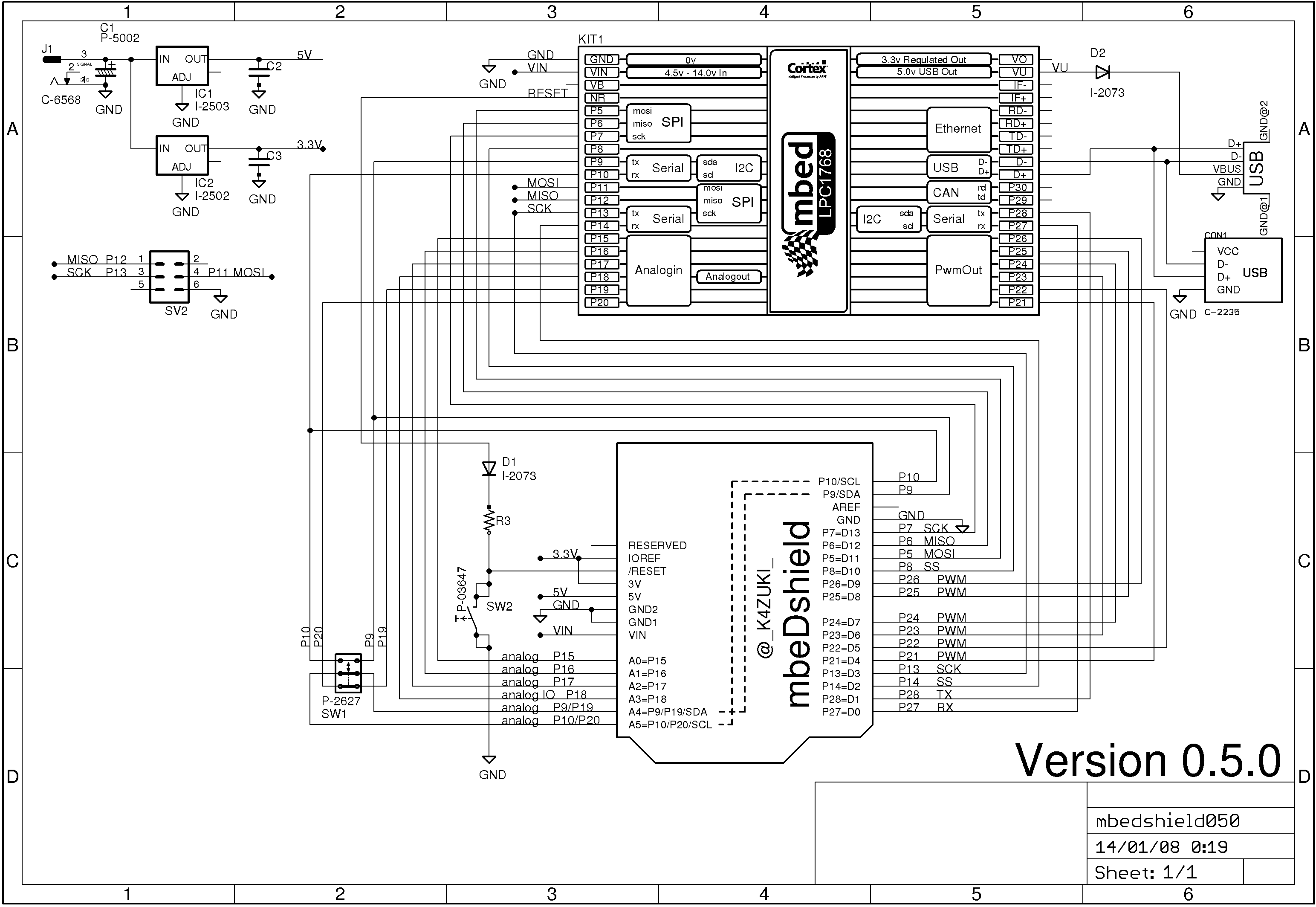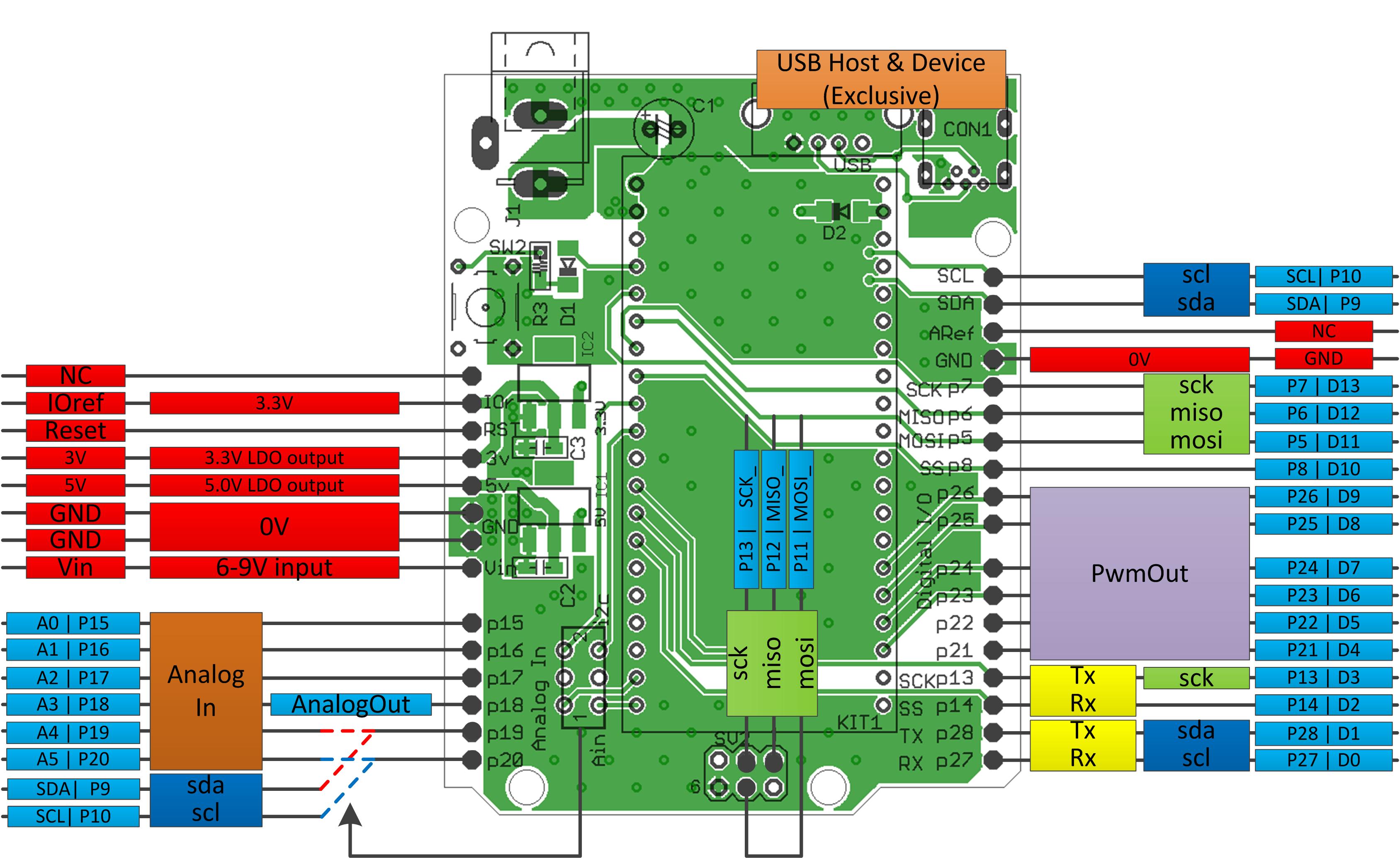The official mbed C/C SDK provides the software platform and libraries to build your applications.
Fork of mbed by
(01.May.2014) started sales! http://www.switch-science.com/catalog/1717/
(13.March.2014) updated to 0.5.0
This is a pin conversion PCB from mbed 1768/11U24 to arduino UNO.
- So if you have both mbed and arduino shields, I guess you would be happy with such a conversion board :)
Photos
- Board photo vvv

- Schematic photo vvv

- Functionality photo vvv

Latest eagle files
PCB >> /media/uploads/k4zuki/mbedshield050.brd
SCH >> /media/uploads/k4zuki/mbedshield050.sch
BIG changes from previous version
- Ethernet RJ45 connector is removed.
- http://mbed.org/components/Seeed-Ethernet-Shield-V20/ is the biggest hint to use Ethernet!
MostALL of components can be bought at Akizuki http://akizukidenshi.com/- But sorry, they do not send parts to abroad
- Pinout is changed!
| arduino | 0.4.0 | 0.5.0 |
|---|---|---|
| D4 | p12 | p21 |
| D5 | p11 | p22 |
| MOSI_ | none | p11 |
| MISO_ | none | p12 |
| SCK_ | none | p13 |
This design has bug(s)
- I2C functional pin differs between 1768 and 11U24.
Fixed bugs here
- MiniUSB cable cannot be connected on mbed if you solder high-height electrolytic capacitor on C3.
- http://akizukidenshi.com/catalog/g/gP-05002/ is the solution to make this 100% AKIZUKI parts!
- the 6-pin ISP port is not inprimented in version 0.4.0
it will be fixed in later version 0.4.1/0.4.2/0.5.0This has beenfixed
I am doing some porting to use existing arduino shields but it may faster if you do it by yourself...
you can use arduino PinName "A0-A5,D0-D13" plus backside SPI port for easier porting.
To do this you have to edit PinName enum in
- "mbed/TARGET_LPC1768/PinNames.h" or
- "mbed/TARGET_LPC11U24/PinNames.h" as per your target mbed.
here is the actual list: This list includes define switch to switch pin assignment
part_of_PinNames.h
USBTX = P0_2,
USBRX = P0_3,
//from here mbeDshield mod
D0=p27,
D1=p28,
D2=p14,
D3=p13,
#ifdef MBEDSHIELD_050
MOSI_=p11,
MISO_=p12,
SCK_=p13,
D4=p21,
D5=p22,
#else
D4=p12,
D5=p11,
#endif
D6=p23,
D7=p24,
D8=p25,
D9=p26,
D10=p8,
D11=p5,
D12=p6,
D13=p7,
A0=p15,
A1=p16,
A2=p17,
A3=p18,
A4=p19,
A5=p20,
SDA=p9,
SCL=p10,
//mbeDshield mod ends here
// Not connected
NC = (int)0xFFFFFFFF
Ethernet.h
- Committer:
- simon
- Date:
- 2010-06-03
- Revision:
- 20:029aa53d7323
- Parent:
- 18:b3c9f16cbb96
- Child:
- 27:7110ebee3484
File content as of revision 20:029aa53d7323:
/* mbed Microcontroller Library - Ethernet
* Copyright (c) 2009 ARM Limited. All rights reserved.
* sford, rmeyer
*/
#ifndef MBED_ETHERNET_H
#define MBED_ETHERNET_H
#include "Base.h"
namespace mbed {
/* Class: Ethernet
* An ethernet interface, to use with the ethernet pins.
*
* Example:
* > // Read destination and source from every ethernet packet
* >
* > #include "mbed.h"
* >
* > Ethernet eth;
* >
* > int main() {
* > char buf[0x600];
* >
* > while(1) {
* > int size = eth.receive();
* > if(size > 0) {
* > eth.read(buf, size);
* > printf("Destination: %02X:%02X:%02X:%02X:%02X:%02X\n",
* > buf[0], buf[1], buf[2], buf[3], buf[4], buf[5]);
* > printf("Source: %02X:%02X:%02X:%02X:%02X:%02X\n",
* > buf[6], buf[7], buf[8], buf[9], buf[10], buf[11]);
* > }
* >
* > wait(1);
* > }
* > }
*
*/
class Ethernet : public Base {
public:
/* Constructor: Ethernet
* Initialise the ethernet interface.
*/
Ethernet();
/* Destructor: Ethernet
* Powers the hardware down.
*/
virtual ~Ethernet();
enum Mode {
AutoNegotiate
, HalfDuplex10
, FullDuplex10
, HalfDuplex100
, FullDuplex100
};
/* Function: write
* Writes into an outgoing ethernet packet.
*
* It will append size bytes of data to the previously written bytes.
*
* Variables:
* data - An array to write.
* size - The size of data.
*
* Returns:
* The number of written bytes.
*/
int write(const char *data, int size);
/* Function: send
* Send an outgoing ethernet packet.
*
* After filling in the data in an ethernet packet it must be send.
* Send will provide a new packet to write to.
*
* Returns:
* 0 - If the sending was failed.
* 1 - If the package is successfully sent.
*/
int send();
/* Function: receive
* Recevies an arrived ethernet packet.
*
* Receiving an ethernet packet will drop the last received ethernet packet
* and make a new ethernet packet ready to read.
* If no ethernet packet is arrived it will return 0.
*
* Returns:
* 0 - If no ethernet packet is arrived.
* The size of the arrived packet.
*/
int receive();
/* Function: read
* Read from an recevied ethernet packet.
*
* After receive returnd a number bigger than 0it is
* possible to read bytes from this packet.
* Read will write up to size bytes into data.
*
* It is possible to use read multible times.
* Each time read will start reading after the last read byte before.
*
* Returns:
* The number of byte read.
*/
int read(char *data, int size);
/* Function: address
* Gives the ethernet address of the mbed.
*
* Variables:
* mac - Must be a pointer to a 6 byte char array to copy the ethernet address in.
*/
void address(char *mac);
/* Function: link
* Returns if an ethernet link is pressent or not. It takes a wile after Ethernet initializion to show up.
*
* Returns:
* 0 - If no ethernet link is pressent.
* 1 - If an ethernet link is pressent.
*
* Example:
* > // Using the Ethernet link function
* > #include "mbed.h"
* >
* > Ethernet eth;
* >
* > int main() {
* > wait(1); // Needed after startup.
* > if(eth.link()) {
* > printf("online\n");
* > } else {
* > printf("offline\n");
* > }
* > }
*
*/
int link();
/* Function: set_link
* Sets the speed and duplex parameters of an ethernet link
*
* Variables:
* mode - the speed and duplex mode to set the link to:
*
* > AutoNegotiate Auto negotiate speed and duplex
* > HalfDuplex10 10 Mbit, half duplex
* > FullDuplex10 10 Mbit, full duplex
* > HalfDuplex100 100 Mbit, half duplex
* > FullDuplex100 100 Mbit, full duplex
*/
void set_link(Mode mode);
};
} // namespace mbed
#endif
